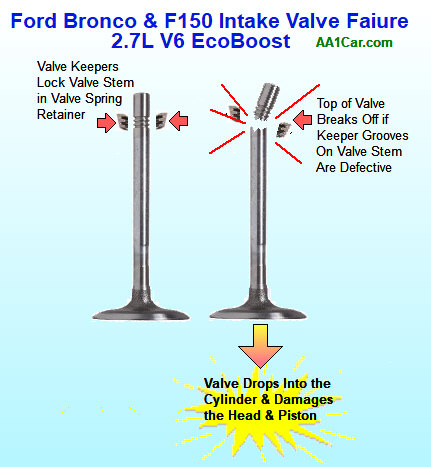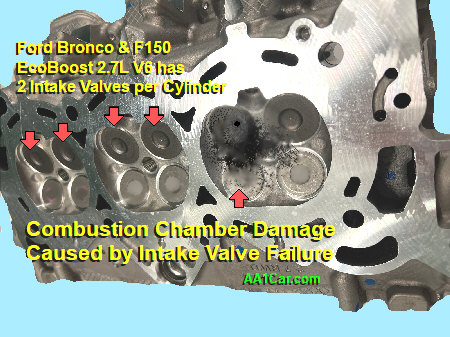
Home, Auto Repair Library, Auto Parts, Accessories, Tools, Manuals & Books, Car BLOG, Links, Index

NHTSA is investigating complaints about engine failures on 2021 & 2022 Ford Bronco, F150 , Ford Edge, Ford Explorer, and Lincoln Nautilus and Aviator with the 2.7L or 3.0L EcoBoost V6 engine. Over 700,000 vehicles are involved in the investigation. A rash of sudden engine failures is being blamed on defective intake valves that may fail and cause severe damage to the engine's cylinders, pistons and combustion chambers.
Investigators have reportedly discovered 328 consumer complaints about sudden engine failures in these vehicles, 487 warranty claims for engine failure, and field reports of 809 engine replacements related to issues with the valvetrain.
The engine's intake valves can fail after only a few miles of use, with the average failure occurring around 2500 miles. Although valve failures have been reported on other Ford engines in the past, those most affected seem to be engines built from May 13 to October 8, 2021 with serial numbers between 21133 and 21281.
Ford says the intake valves in these engines were made from a special weight-saving alloy called Silchrome Lite. These valves must be carefully heat treated during manufacture because getting them too hot can make the alloy too hard and brittle, increasing the risk of cracking and sudden failure. The Silichrome Lite alloy has since been discontinued and replaced with a different alloy called Silchrome that is less prone to cracking and failure.
Ford has NOT issued a recall notice as of October 2023, but they are replacing engines when a valve-related failure occurs for as long as the vehicle is covered by its powertrain warranty (5 years or 50,000 miles on Ford models, and 6 years or 70,000 miles on Lincoln models).
Ford says a recall should not be necessary because most of the failures that were likely to happen due to the questionable intake valves have probably already happened. That may be true, but it is little comfort to somebody who owns one of these vehicles.

Intake and exhaust valves are held in place by a pair of steel keepers or locks that fit into small grooves machined into the top area of the valve stems. The keepers fit tightly around the stem and are held in place by spring tension against the large valve spring retainer above the valve.

As long as the valve keepers remain in place and the spring retainer does not fail, the valves should stay in place for the normal service life of the engine (150,000 miles or more) without causing any problems. But if a retainer cracks or allows the valve to pull through, or a keeper breaks or comes loose, or the end of the valve stem breaks off because the valve was improperly heat-treated, the valve will drop into the cylinder and cause extensive damage to the combustion chamber, cylinder and piston. The engine won't start or run, and will have to be rebuilt or replaced.
Auto makers typically do NOT rebuild engines because it is too labor intensive and expensive. It is faster and easier to remove the damaged engine and replace it with a brand new engine, or in some cases a factory or aftermarket remanufactured engine.

The reported valve failures in the EcoBoost 2.7L V6 (and 3.0L V6, which uses the same intake valves), appears to be due to the top portion of the intake valves snapping off. The breaks are occurring in the area where the grooves are machined into the valve stem to hold the keepers. This is the most highly stressed portion of the valve stem and most likely to break if the steel is not properly heat treated. The defect is being blamed on a batch of bad intake valves from an outside vendor who supplied Ford with the valves.
In addition to improper heat treating, other manufacturing defects may be contributing to the sudden valve failures. These include incorrectly machined keeper grooves in the valve stems (too deep, too shallow or wrong size), or incorrect surface finish (too rough).
Ford has a major problem on its hands because a recall would require replacing hundreds or possibly even thousands of V6 engines at considerable expense! Replacing the intake valves is also impractical because of the considerable expense to remove, disassemble and rebuild a lot of these engines. A more likely "fix" is that Ford will extend the powertrain warranty to cover future failures. Other auto makers have done this when they discovered they had major problems with their engines.
As for the people who bought the affected vehicles with the EcoBoost engines, they will be left wondering if and when their engine might fail. As we said earlier, most of the engine failures that were likely to occur due to the bad valves have probably already happened. Even so, there are still thousands of these vehicles on the road so who can say how reliable they might be? This kind of situation can significantly hurt the trade-in and resale value of these vehicles. Consequently, we will likely see some kind of class action lawsuit to litigate the issue.
We will update this article if and when more is known about this issue.
 More Engine Repair Articles:
More Engine Repair Articles: Click Here to See More Carley Automotive Technical Articles
Click Here to See More Carley Automotive Technical Articles